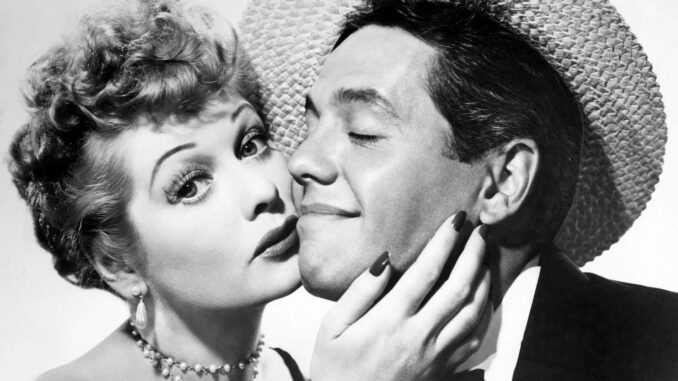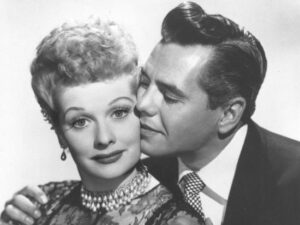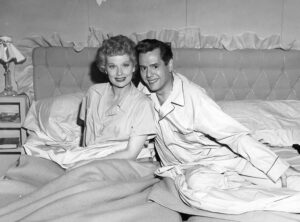
Few television couples have stood the test of time like Lucy and Ricky Ricardo from I Love Lucy. From their on-screen chemistry to their timeless humor, they’ve left a mark that transcends generations. But what is it about this iconic duo that still makes them the benchmark for TV romance today? Let’s take a journey through the qualities that keep Lucy and Ricky at the top of the list of unforgettable TV couples.
The Chemistry That Made History
Lucy and Ricky’s relationship was the epitome of chemistry. Lucille Ball and Desi Arnaz, who were married in real life during the show’s run, brought a natural rapport to their characters that made every scene believable. Their chemistry wasn’t just about romance—it was about timing, humor, and an undeniable spark that made viewers believe in their love, quirks and all.
How Real-Life Love Enhanced On-Screen Magic

One of the reasons Lucy and Ricky resonated so well with audiences was that their on-screen relationship wasn’t just acting. Lucille Ball and Desi Arnaz were married off-screen, and their genuine love (along with its complexities) found its way into their performances. This unique aspect made I Love Lucy feel authentic, as their real bond brought an unmatched layer of depth to their characters.
A Marriage Built on Love and Laughter
Lucy and Ricky’s relationship was anything but ordinary, and it’s partly why they remain unforgettable. Their marriage was full of laughs, as Lucy’s antics were met with Ricky’s sometimes stern but always loving responses. This comedic dynamic broke the mold of typical husband-and-wife portrayals in the ’50s, showing that love didn’t have to be perfect to be endearing.
Breaking the Mold of the ‘50s Husband and Wife
In the 1950s, TV couples were often portrayed as the idealized vision of domestic life, with perfect homemaking wives and breadwinning husbands. Lucy and Ricky flipped this idea on its head. Lucy was anything but a typical wife—she was ambitious, mischievous, and always seeking more out of life, which Ricky had to balance with patience and love. This dynamic was fresh and relatable, showing that real relationships have humor, disagreements, and a little chaos.
The Comedy That Set the Bar
The humor between Lucy and Ricky was legendary, and it wasn’t just slapstick. Their comedic timing and mutual love for pushing each other’s buttons made every episode a joy to watch. Lucy’s knack for getting into trouble and Ricky’s attempts to keep her grounded created a dynamic that was humorous, heartfelt, and authentic.
How Their Humor Felt Like Home
Lucy’s escapades and Ricky’s reactions gave audiences a couple they could laugh with, not just laugh at. The show struck a perfect balance between comedy and genuine affection, making it feel like you were watching real-life moments play out. This grounded humor is why their relationship has such staying power—they weren’t just funny; they felt real.
Iconic Moments That Defined TV Romance
Certain episodes and scenes of I Love Lucy are iconic in television history. From Lucy’s grape-stomping escapade to Ricky’s passionate singing performances, these moments became symbols of what a couple could be on screen—playful, loving, and endlessly entertaining.
Unforgettable Episodes That Set Relationship Goals

Episodes like “Lucy Does a TV Commercial” (where Lucy famously tries to sell Vitameatavegamin) or “Job Switching” (where Lucy and Ethel get jobs at a chocolate factory) aren’t just hilarious; they showcase a couple that tackles life’s challenges together, even if they bicker along the way. These episodes resonate because they show Lucy and Ricky navigating real relationship dynamics, from misunderstandings to supporting each other’s dreams.
The Cultural Impact of Lucy and Ricky
Lucy and Ricky’s relationship broke cultural barriers as well. At a time when TV rarely featured interracial couples, their marriage brought Cuban and American culture together in a way that hadn’t been done before. Desi Arnaz’s Cuban background was embraced rather than hidden, making Lucy and Ricky pioneers in TV diversity.
A Pioneering Representation of Love Across Cultures
Their love story was revolutionary, showing audiences that love could cross cultural boundaries. Ricky’s Cuban heritage was a key part of the show, with episodes highlighting Latin music, dance, and even language. Their relationship showed that cultural differences could be a source of joy, not conflict, setting a positive example for multicultural relationships.
Why Modern TV Couples Still Struggle to Measure Up
Lucy and Ricky’s relationship set a high bar, and many modern TV couples have struggled to capture that same magic. Some couples are overly dramatic, while others lack the chemistry to make their romance believable. Lucy and Ricky had the perfect blend of humor, heart, and relatability that continues to elude many TV couples today.
Relatable Yet Unmatched: The Standard Lucy and Ricky Set
What Lucy and Ricky offered was an authentic glimpse into a marriage that had quirks, humor, and, most importantly, respect. Many modern couples focus too much on drama or idealized perfection, but Lucy and Ricky were a realistic blend of love and challenges. Their appeal lies in their relatability—they weren’t perfect, but they were perfect for each other.
The Legacy of ‘I Love Lucy’ in Pop Culture
Decades later, Lucy and Ricky are still referenced in pop culture. From TV shows to movies, their relationship is seen as the gold standard for portraying love in a realistic and endearing way. They’ve left a legacy that goes beyond laughs, setting an example for how love can be fun, supportive, and everlasting.
How Their Influence Shaped Generations of TV Couples
The impact of Lucy and Ricky on TV couples is evident in almost every romantic comedy that followed. Shows like Friends, How I Met Your Mother, and even Modern Family have drawn inspiration from Lucy and Ricky’s balance of humor and heart. Their legacy is a testament to the fact that real love is timeless, as long as it’s honest and filled with laughter.
Why Lucy and Ricky Will Always Be the Gold Standard
Lucy and Ricky represent the ideal balance of romance and realism. Their love wasn’t just about grand gestures; it was about daily interactions filled with humor, patience, and compromise. For these reasons, they remain the gold standard for TV couples, reminding us that love is about finding joy in the imperfections and laughing together through life’s ups and downs.
Conclusion
In an era where television is constantly evolving, the love story of Lucy and Ricky remains timeless. They didn’t just represent a couple in love; they represented the everyday ups and downs that make a relationship genuine. Their humor, chemistry, and cultural impact make them more than just characters—they’re the embodiment of a lasting romance that still feels relatable today.
FAQs
1. Why did Lucille Ball and Desi Arnaz have such great on-screen chemistry?
Their real-life marriage brought a natural rapport to their characters, which made every interaction feel genuine.
2. How did Lucy and Ricky’s relationship differ from other TV couples in the 1950s?
Unlike typical portrayals, they embraced humor, cultural differences, and everyday challenges, making their relationship feel authentic and relatable.
3. Did I Love Lucy pave the way for more diverse representation on TV?
Yes, Desi Arnaz’s Cuban heritage played a significant role, marking a milestone for multicultural representation on television.
4. What episodes best showcase Lucy and Ricky’s dynamic?
“Lucy Does a TV Commercial” and “Job Switching” are iconic episodes that highlight both the humor and depth of their relationship.
5. Why are modern TV couples often compared to Lucy and Ricky?
Lucy and Ricky set a high standard with their balance of love, humor, and realism, qualities that remain the ideal for TV couples today.